Guaranteed Raccoon Removal
Fast, safe, effective wildlife removal for your home or business
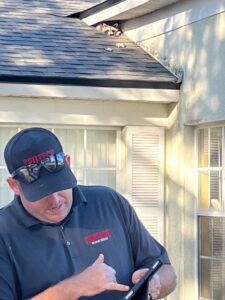
Raccoon Removal Company
Hearing loud thumping at night, finding tracks, or dealing with raccoon droppings?
Raccoons are among the most bothersome and destructive pests that homeowners encounter. They cause severe property damage and spread diseases to you and your family.
The experts at Trutech Wildlife Service rely on over four decades of experience and training to get raccoons out of your house safely and quickly.
If you see a raccoon on your property or see signs of raccoon activity, it’s time to start thinking about how to remove it. Common raccoon problems include property damage, health risks, and nuisance activity like creating unpleasant odors and bothersome noises.
Signs of Raccoon Infestation

Nuisance Raccoon Problems
Listen Raccoon Noises
The most common sign of a raccoon in your house is the noises like:
- thumping
- scurrying
- purring
- chittering
- growling
- snarling
- hissing
- whimpering
- screeching
Physical Evidence
For nocturnal critters, spotting a raccoon is rare. Homeowners are more likely to see physical evidence like
- dispersed trash
- raccoon tracks
- raccoon poop
- damage

Raccoon Damages
Raccoons are one of the most common and destructive nuisance wildlife infestations homeowners experience.
Health risks linked to raccoon invasions
Raccoons can carry several diseases and parasites that can be transmitted to humans and pets:
- Rabies
- Raccoon roundworms (Baylisascaris procyonis)
- Tularemia
- Tiardia
- Salmonellosis
- Canine distemper
- Leptospirosis.
Ectoparasites like fleas, ticks, lice, and mites can live on raccoons. These parasites can find new hosts once they have been introduced inside your house. Raccoons can introduce fleas into your house and potentially spread canine distemper to your dog.
Property damage caused by raccoons:
Raccoons are notorious for their ability to cause extensive damage to properties. They are skilled climbers and can easily access attics, crawlspaces, and chimneys. Once inside, raccoons can tear apart insulation, chew electrical wires, and damage ventilation systems. They may also create nests, leaving behind droppings and urine that can lead to foul odors and potential health hazards
How We Get Rid of Raccoons
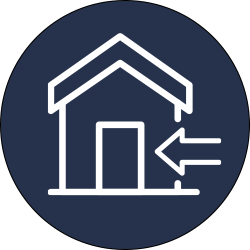
Full Inspection
We develop a custom plan to solve your raccoon problem based on our exhaustive inspection.
We first inspect the area you first noticed an issue. From there, they will look for entry points inside your home, investigate your property including your roof, and identify physical evidence like raccoon tracks and droppings.

Raccoon Trapping
Live traps are the most effective and humane way to remove a raccoon from a property. We set and bait the traps to capture a raccoon but limited the possibilities of catching a non-target species. Each state has its own trapping and relocating laws. Once the raccoon traps are set, we check it frequently.
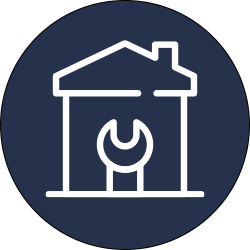
Exclusion for Raccoon Control
Exclusion repairs are the most effective raccoon control. After raccoon removal, we seal all entry points with material to block all potential raccoon entry points. Some of the most common damage repairs include chimney caps, roof vents, and shingles.
Additional Raccoon Services
The job does not stop at raccoon trapping. The experts at Trutech can provide a comprehensive service. Raccoons introduce health hazards to your house through their waste and eco-parasites. We apply treatments to the affected areas that exterminate pests like ticks, fleas, and mites. Our sanitization agents will disinfect raccoon latrines. In extreme cases, we can conduct a full attic restoration.
Our whole home exclusions come with a one-year warranty. If during that time a raccoon re-enters the area we excluded, we’ll take care of that problem no questions asked.
We are not satisfied until you are.
Why Chose Trutech Wildlife Service
- Guaranteed services
- Over 40 years of experience
- Licenses & insured experts
- Financing available
At Trutech Wildlife Service, we pride ourselves on offering humane raccoon removal services that prioritize the safety of you and your family, your property, and the animal.
Our team of experienced and certified technicians uses humane and eco-friendly methods to ensure a safe and effective removal process. We provide a comprehensive service that includes thorough inspection, humane removal, meticulous damage repair, and proactive prevention measures.
When you choose Trutech Wildlife Service, you can trust that we will handle your raccoon problem with the utmost professionalism and care, giving you peace of mind and a raccoon-free home. Contact us today for a free quote and let us help you reclaim your space.
Raccoon Removal Near Me
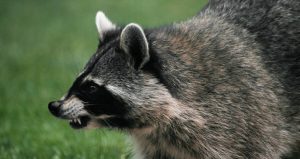
Raccoon Removal in Raleigh-Durham
Raccoons thrive in every county in North Carolina. Since 1987 evidence suggests the raccoon population is growing. Their preferred habitat has easy access to water,
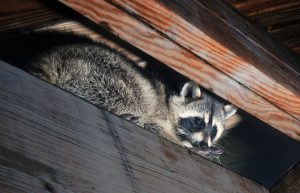
Raccoon in Attic in Flower Mound
A homeowner in Flower Mound heard loud thumping noises in the middle of the night. They investigated their attic and found dark, tubular droppings. During

How to Trap Raccoons in Jacksonville, FL
The increasing development in Jacksonville might actually benefit raccoons. Found throughout Florida, their natural habitat has plenty of trees and a reliable source of water.

Raccoon Removal in Dallas, TX
Raccoons can wreak havoc trying to gain entry to your home and cause significant damage creating a den in your attic. They can cause a
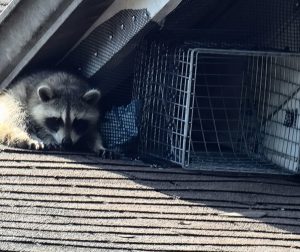
Raccoon Removal in Dallas-Forth Worth
Raccoon damage to yards, roofs, attics, and crawlspaces costs homeowners thousands of dollars in repairs every year (a standard homeowner’s insurance policy might cover the cost of
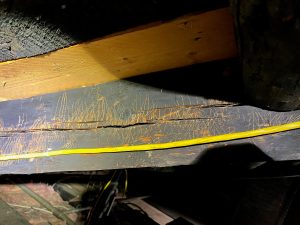
How to Get Rid of Raccoons in Boston
Raccoons live throughout Massachusetts except for Nantucket in a variety of habitats including residential and urban areas. Food sources and den sites attract raccoons to
Frequently Asked Questions
Raccoons typically cause problems by rummaging through garbage cans, raiding pet food, and disrupting quiet neighborhoods at night. However, like most wildlife, raccoon behavior may turn aggressive when these pests feel threatened.
Raccoon teeth and claws are sharp, and these powerfully built animals can reach up to 20 pounds in weight. As a result, a raccoon attack, though rare, can be dangerous to people, cats, and dogs.
There are a number of diseases that people can be exposed to by coming in contact with raccoons. The common ones include rabies, leptospirosis, and baylisascaris infection. These raccoon diseases have symptoms like pain, fatigue, fever, vomiting, and diarrhea that mimic the flu, making many victims underestimate the need to seek medical attention. Left untreated, more serious ailments like organ failure can develop.
Many residents want to know how to deter raccoons rather than how to trap them. Trapping is an effective way to remove these pests, but it also comes with some dangers to users. Several raccoon deterrents may help while posing less risk.
Scare and Harassment Tactics
Raccoons prefer dark, quiet places like attics, chimneys, or gaps beneath decks. Keeping these areas well-lit and playing loud music can disturb their rest and force the pests to move. Pinwheels, balloons, or empty soda cans blowing in the wind may also deter raccoons.
Unfortunately, sound, light, and frightening tactics become less effective as the animals get used to them. These cheap, easy methods are a good first step but may not be enough to keep raccoons away for good.
Habitat Modification
Eliminating sources of food and shelter in the yard is another raccoon deterrent. Homeowners can:
- Screen attic, porch, and foundation vents with heavy duty wire mesh.
- Secure the garbage can lid with bungee cords or buy a new bin with a tight-fitting lid.
- Remove outdoor pet food or seal it in secure metal or glass containers.
Property owners may be alerted to the presence of raccoons under decks through various sights, sounds, and smells. The pests designate an area to eliminate waste, known as raccoon latrines, that smell abhorrently and contribute to the spread of disease. Finding a latrine in the yard is a sure sign of infestation. Additionally, raccoons make scratching noises and vocalizations throughout the night that may keep residents awake. The presence of tracks around private properties also points to the existence of raccoons under decks. Finally, individuals can test for the presence of the pests by situating a few sticks just outside deck openings. Placing them so that no animal could move through without disturbing the sticks allows for safe raccoon detection.
Thumping, rustling, and scratching sounds coming from the attic are clear indications of animal infestations. Raccoons are especially playful and like to tumble about, making loud noises that disturb residents. Young raccoons also like to chatter and chirp when calling for their mothers. Additionally, while raccoons generally dispose of waste away from nesting sites, they may let their droppings and urine collect in attics. The overwhelmingly foul smell quickly permeates houses.
Since they are voracious and messy eaters, raccoons leave behind telling signs of their presence. In the search for bits of digestible food, the pests discard paper products, plastic bags, and similar pieces of garbage. Therefore, when property owners are dealing with raccoons in trash, they’re likely to wake up to debris strewn about their yards. Additionally, given the prospect of a steady food source, raccoons will construct nests nearby. Individuals may also be alerted to raccoons in the trash by the sighting of adults, tracks throughout lawns, and the odorous presence of raccoon latrines.
Though sightings of the pest are rare given their nocturnal nature, property owners are able to detect the presence of raccoons in trees many other ways. For instance, raccoons often leave tracks in the dirt around the base of trees they’re living in. These tracks are distinct in their resemblance to tiny human hands. Their claws, which make them excellent climbers, are used to scratch trees, walls, and fences, and finding scuffed paint and tree bark typically points to raccoon infestations. At night, residents may hear chattering, growling, or snarling sounds. Finally, the presence of droppings at the base of trees points to the existence of raccoon populations in the area.
Raccoons won’t necessarily go away independently, especially if they have access to food and water nearby. They may leave temporarily to visit another den but return. Unfortunately, you will have to convince a raccoon to move away permanently. Working with professional wildlife control experts like Critter Control is the best way to do this.
Critter Control technicians have traps and equipment for effective, humane removal practices. They ensure your safety and the safety of the raccoon. After removal, they implement exclusions to prevent future raccoon encounters.
The experts at Trutech first identify the extent of raccoon activity to help them create an effective removal plan. They aim to create the safest and most humane way of raccoon removal, which will likely involve using a custom trap.
When trapping, our technicians place safe and humane cage traps in areas where raccoons frequent, usually on concrete or dirt, if possible. Because traps must be checked regularly, they must be placed where they can easily access them.
Raccoons have extremely dexterous front paws with long nails that help them destroy everything they can get their hands on when trapped. For example, the lawn underneath the trap and nearby flowers or shrubbery will likely be damaged if accessible. Never go near the trapped animal to avoid getting scratched or clawed; let Trutech handle it with their safety gear.
Our experts will know exactly what to do with the raccoon after its capture. They may need to deliver it to the local wildlife department for rabies testing or obtain permission to relocate it to another property.
Many factors determine raccoon removal costs, including location, the raccoon’s condition, the type of property, the number of raccoons involved, and the time of year. You should never try raccoon removal by yourself. You may violate local or state laws and regulations, contract a disease by getting bitten or scratched, or cause further damage to your property.
At the first sign of raccoon activity, contact Trutech for a quote that includes inspecting your property, removing the raccoon, and implementing exclusions so you don’t have to worry about raccoon infestations in the future.


